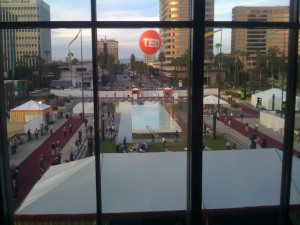TED Day 1 Roundup (#TED)
This is our second daily post covering this week’s TED conference. You can follow all our TED coverage.

For a conference that’s supposed to be about long-term ideas, those ideas sure get spread at record speed. Thanks to blogs and especially Twitter, reports from the first day of this year’s TED conference (here’s a TED primer for managers, if you need one) began flowing within seconds after a speaker noted something particularly noteworthy. As I write this post before dawn the following morning, I see that there is plenty of good, almost-instant coverage, particularly from Ethan Zuckerman, BoingBoing, and the official TED blog. Rather than deliver a blow-by-blow list of everything that happens, which can get tedious quickly and allows for hardly any reflection, the idea here is to identify the most important parts of the long day and night (with 48 speakers or performers, events started at 8:30 a.m. and ran past 11 p.m. — and that’s just the official events) and give a sense of what it is like to be here.
This is our second daily post covering this week’s TED conference. You can follow all our TED coverage.
For a conference that’s supposed to be about long-term ideas, those ideas sure get spread at record speed. Thanks to blogs and especially Twitter, reports from the first day of this year’s TED conference (here’s a TED primer for managers, if you need one) began flowing within seconds after a speaker noted something particularly noteworthy. As I write this post before dawn the following morning, I see that there is plenty of good, almost-instant coverage, particularly from Ethan Zuckerman, BoingBoing, and the official TED blog. Rather than deliver a blow-by-blow list of everything that happens, which can get tedious quickly and allows for hardly any reflection, the idea here is to identify the most important parts of the long day and night (with 48 speakers or performers, events started at 8:30 a.m. and ran past 11 p.m. — and that’s just the official events) and give a sense of what it is like to be here.
The two stars of the big morning session were Juan Enriquezand Bill Gates. Enriquez is the sort of polymath made for a diverse conference like TED: he’s done everything from run the Life Sciences Project at Harvard Business School to serve as a member of the peace commission in Mexico that negotiated the cease-fire in Chiapas’ Zapatista rebellion. He’s best-known, perhaps, as a presenter: I’ve witnessed him speak engagingly on everything from why schools in the Arabic world used to be the best in the planet but aren’t anymore to why being knowledgeable about genetics is just as important as being digitally literate.
Back in October, just as the political and business leaders were starting to understand the ramifications of the financial crisis, Enriquez delivered a raw, whirlwind presentation at the Pop!Tech conference that focused on what the then-yet-to-be-elected new president needed to do, with an emphasis on austerity. I don’t know how long it will be until Enriquez’s talk yesterday is posted to TED.com, but those who want a taste of it can see an earlier iteration from Pop!Tech:

